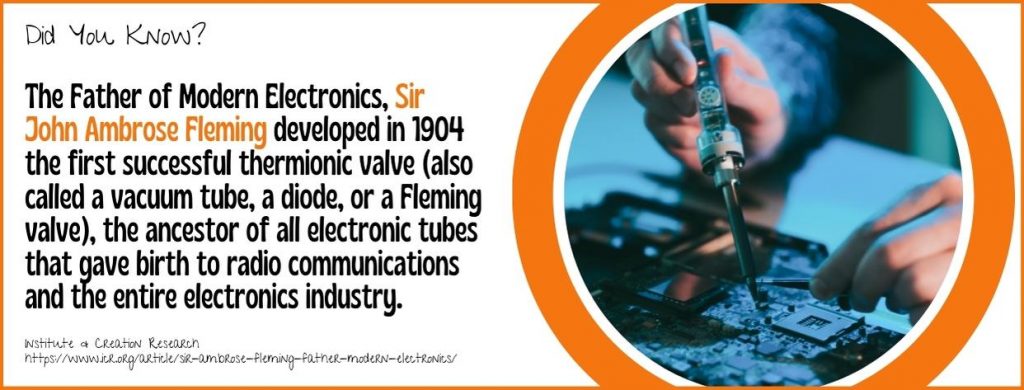Find Your Perfect School
The products and services of electronics engineering are so ubiquitous that we use them without even thinking. Just think of the digital devices in your home, offices, and stores, from smartphones to smart appliances. Electronics engineering and its associated discipline, electrical engineering technology, are also instrumental in industrial electronics.
But what exactly is electronics engineering?
Electronic engineering is the STEM discipline that focuses on electrical circuits and their components, from their design and testing to their integration into computer systems using programming languages. Electronics engineering is a multidisciplinary field, too, that overlaps with machine learning, artificial intelligence, and computer engineering technology.
Electronics engineering and electrical engineering are distinct disciplines but with many overlapping engineering principles. Electrical engineering is a branch of engineering that focuses on the technology of electricity.
While electrical engineering concerns itself with the large-scale production, transmission, and distribution of electricity, electrical engineering concerns itself with the manufacture of smaller digital devices and their electrical circuits.
Quick Summarization
When you earn an associate degree in electronics engineering or electronics engineering technology, you are establishing a solid career path in the electronics engineering industry. Furthermore, an associate degree in electronics engineering can be your ticket to careers in electrical engineering technology. Such versatility of switching between electrical engineering and electronics engineering makes the associate degree among the best value degrees in our books.
But don’t stop with an associate degree either as you can take it further with a bachelor’s degree! Higher education may have its challenges but the rewards, particularly career advancement as an electrical engineering technician or an electronics engineer, make it worthwhile.
Check Out The Top Schools! Use These Page Jumps:
- University of Arkansas Grantham
- ECPI University
- Eastern New Mexico University
- University of Massachusetts Lowell
Methodology
Be at the forefront of engineering technology daily! Look into colleges and universities offering online associates in electronics degrees and become an electrical engineer. You will certainly find employment in diverse industries, from healthcare to manufacturing!
Check out our list of the outstanding programs with these distinctive features that demonstrate their high academic standards and the positive overall learning experience they provide each student:
- Offered as a 100% distance learning or hybrid learning program to emphasize class attendance and scheduling flexibility,
- Promotes a comprehensive, foundational knowledge of Electronics principles and applications that may prove useful for entry-level job positions, or in a related bachelor’s program students can choose to pursue to bolster their academic credentials,
- Taught by an outstanding panel of seasoned electronic engineers and experts as instructors,
- Emphasizes an easy transition of Electronics associate’s degree graduates to a bachelor’s program through Transfer Pathways,
- Provides students opportunities for online associate program funding through financial aid options,
- Obtained official recognition from accrediting organizations that govern the academic standards,
- Affiliated with industry associations that particularly advocate Electronics as a discipline and career
Please explore our Methodology page for details.

4 Best Online Associate in Electronics Degree Programs
University of Arkansas Grantham
The online Associate of Science in Electronics and Computer Engineering Technology degree program offered at UA Grantham prepares students for jobs as electronics technicians. This is the best associate of science in the electronics engineering technology program because of its dual emphasis on electronics engineering and computer engineering.
Students gain workplace-ready skills in computer programming, digital and analog electronics, and circuit theory and design. Since it’s an associate degree, it meets the requirements for the first two years of a bachelor’s degree in either computer engineering technology or electronics engineering technology.
The AS in Electronics and Computer Engineering Technology has a two-year timeline and a 60-credit curriculum:
- Knowledge and hands-on experience in electronics engineering technology come in the form of laboratory work in AC/DC circuits and digital electronics.
- Soft skills relevant to electronics engineering are developed through general education courses like technical writing.
ECPI University
This online Associate of Science in Electronic Engineering Technology program trains students in the proper design, assembly, and testing of electronic equipment and control systems. Students can complete the Associate of science in Electronics Engineering Technology program in 1.5 years.
Students in the online associate degree in electronics engineering technology program tackle core courses in electric circuits, circuit design, solid-state devices, and digital systems. Learners also gain hands-on experience using workplace technology and learn their operations.
ECPI University, a private university, is accredited by the Southern Association of Colleges & Schools Commission on Colleges.
Eastern New Mexico University
The online Associate of Science in Electronics Engineering Technology program at ENMU provides students with both theoretical knowledge and hands-on experience in electronics applications. With only a high school diploma, students can earn an associate of science in electronics engineering technology degree in two years.
Students learn via a combination of laboratory activities, assignments, and lectures, as well as cover diverse topics in electrical engineering technology in particular and engineering technology in general. ENMU ensures that its students complete the electronics engineering technology program through exceptional resources and services.
University of Massachusetts Lowell
This hybrid Associate of Science in Electronic Engineering Technology program enables its students to earn 66 credits in the associate degree for transfer into a Bachelor of Science in Electronic Engineering Technology program.
Students build their knowledge and skills in electronics engineering technology with courses in:
- circuit design
- microprocessors
- electronics
Hands-on experience comes in the way of laboratory work in the associate in electrical engineering technology program.

Overview of Online Associate in Electronics Degree Programs
College students in online associate degrees in electronics engineering technology programs must be prepared for the academic rigor involved in the STEM field.
Admission Requirements
The admissions process in the best online programs offering an associate degree in electronics engineering technology can be competitive. This is due to the strong emphasis on math and science skills, meaning applicants should not only possess a high school diploma but also have sufficient aptitude for STEM subjects.
Average Time-to-Completion
College students enrolled in online programs offering an associate degree in electronics engineering technology can successfully complete the program of study in two years. This translates to four to five semesters of full-time study, and each course has a 6-week to 8-week duration. Part-time students will take another academic year or more to earn the associate degree.
Curriculum and Courses
Online associate degree programs in electronics engineering technology follow the standards of higher education including academic rigor in the following courses. Note that online education is widely accepted by employers today. The best associate degree in electronics engineering technology also has a skills-focused curriculum with a laboratory component.
Electronics
This is a foundational course on the theories behind the diode and transistor circuits, as well as the use of circuit simulation software in their design and analysis.
Digital Electronics
The introductory course teaches students about the basics of digital electronics with topics on logic gates, PLCs, and number systems and codes.
AC and DC Circuits
The comprehensive course tackles the properties of the AC and DC circuits with special emphasis on electrical engineering principles, components, and units. Students learn about these circuits via a circuit simulation tool, too, meaning both knowledge and hands-on experience are gained.
Computer Programming Courses
The series of courses teach students about the various programming languages, such as C++ and Java, in relation to electronics engineering. Topics covered include data structures, control structures, and overloading.
Online Learning Format
Earning an associate’s in Electronics Engineering Technology via online education has its challenges including learning the online technology. As soon as you become familiar with this learning format, the process becomes easier and you will likely thrive.
Specific Technologies
The typical online electronics engineering associate degree programs use a learning management system where students access their learning materials, complete assignments and class projects, and even perform laboratory work. Live and recorded lectures are common. Canvas, Mediasite, Moodle, and Blackboard are a few examples of LMS.
Overview of Careers as Electronic Engineering Technicians and Technologists: Education and Licensure, Roles and Responsibilities, and Skills
Electronic engineering technologists and technicians made a median of $66,390 annually as of May 2022, says the official Bureau of Labor Statistics data. Graduates of electronics engineering technology degree programs can look forward to well-paying jobs, as well as about 9,900 openings for electronic engineering technologists and technicians every year.
Education and Licensure
Electronic engineering technologists and technicians have an associate degree in either electronics engineering or electronics engineering technology. Both associate degrees are offered at vocational-technical schools and community colleges, and cover topics in programming languages, electrical systems, and electrical engineering principles.
Graduates of associate in electronics engineering and electronics engineering technology degree programs aren’t required to secure licenses and certifications. But ambitious electronic engineering technologists and technicians may seek certification from National Institute for Certification in Engineering Technologies (NICET).
Roles and Responsibilities
Professionals involved in electronics engineering technology may have different job titles but their roles and responsibilities have many similarities. Industrial safety is a common thread in engineering technology due to the hazards posed by electricity.
Electronic engineering technologists and technicians create sketches of basic circuitry, build prototypes, and assemble, test, and maintain digital devices and their components.
Workplace Skills
Both electronics engineering and electronics engineering technology may place heavy emphasis on engineering technology and electrical engineering principles but technical skills aren’t all there is to these disciplines! While technical skills including mechanical skills are a must for industrial safety and other purposes, transferable skills are also essential for success.
Electronic engineering technologists and technicians critically analyze problems and suggest solutions to electronic engineers or electrical engineers. Their communication skills including the ability to convey issues and follow instructions are also essential, as is being detail-oriented.
Career Prospects for Graduates of Associate in Electronics Programs
With an associate degree in electronic engineering, you will find employment in diverse settings and establish a career path in the industry.
Electronics Technicians and Technologists ($66,390)
These professionals assist electrical and electronics engineers in the design, development, and maintenance of electronic devices and equipment.
Relay Protection and Control Technicians ($66,035/year)
These technicians work under the supervision of electrical engineers in the maintenance of electrical power stations and their corresponding electrical systems.
Field Technicians ($55,931/year)
On-site servicing including troubleshooting and repairs of electrical equipment and electronic devices is among the primary duties of field technicians.
Engineering Technicians ($62,728/year)
Engineering technicians with electrical and electronics engineers in solving technical issues, setting up equipment, and collecting information about electrical equipment.
Repair Technicians ($49,337/year)
If you want to become a repair technician, an associate degree in electronics engineering will set the foundation for your career path.

Frequently Asked Questions
How can you choose the best Associate degree in Electronics Engineering program?
Look for the accreditation status first and then consider the cost, curriculum, and quality of instruction.
Is an Associate degree in Electronics Engineering worth it?
Yes, it is, thanks to the excellent employment prospects in diverse industries. But, you must be passionate about electronics and skilled in its aspects to be competitive.
Who is the ideal candidate for an Associate degree in Electronics Engineering?
Students must love working on mathematical equations and solving complex problems in real-world settings.
What is an Associate degree in Electronics Engineering Technology?
This is a technical degree that prepares learners for various job titles related to the field of electronics technology, such as engineering technicians.
What’s the best major for an individual who likes electronics?
Electronics engineering is the best fit, and it’s possible to choose a specialization like digital signal processing or robotics and automation.
Key Points to Ponder
- An associate degree in electronic engineering technology opens doors of opportunities to gainful employment that a high school diploma can’t!
- However, it’s also crucial to show your professional competencies and proficient knowledge in electric power technology to be more competitive.
- It’s also suggested that you pursue a bachelor’s degree to have better job prospects and earn higher wages.
Additional Resources:





